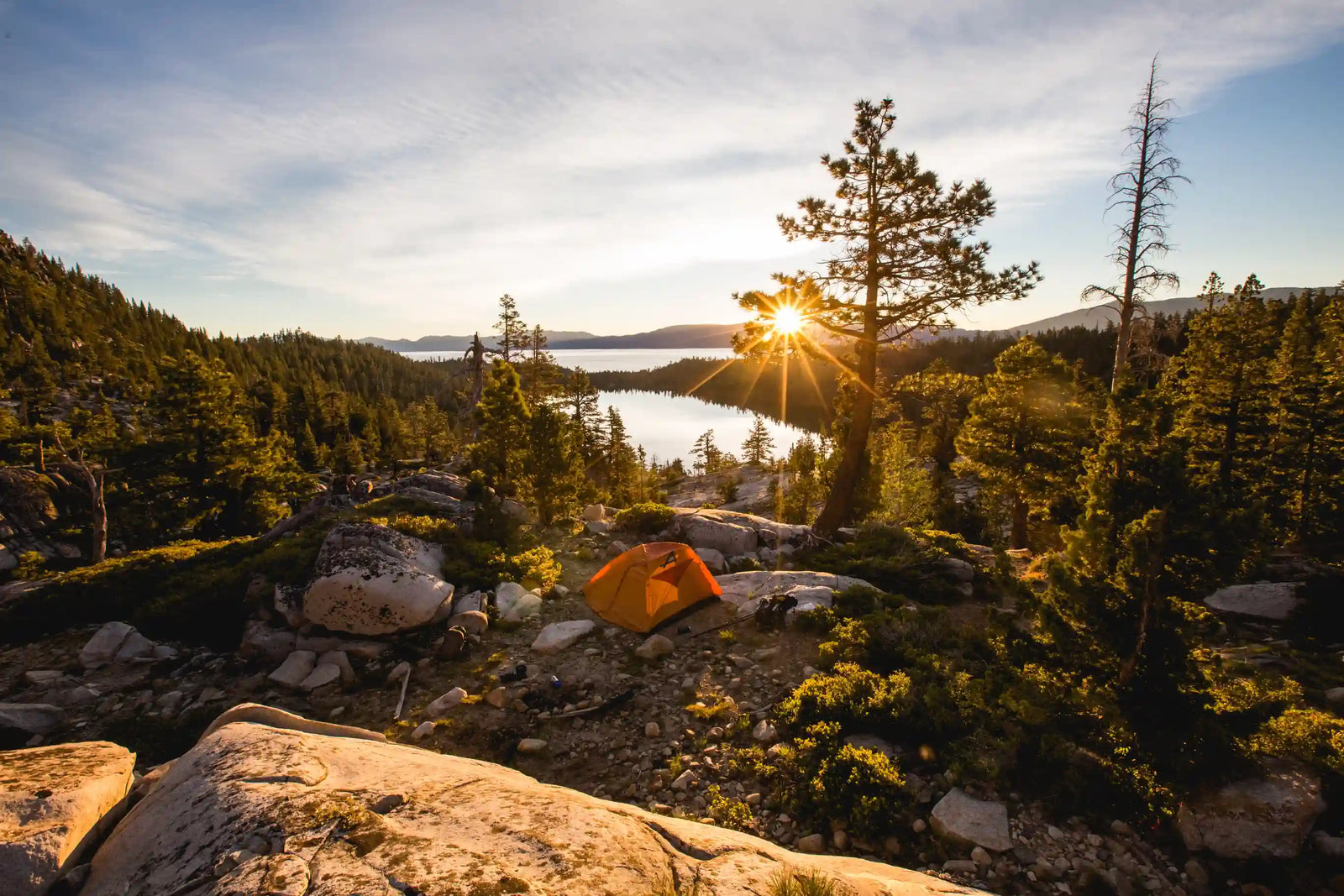Do you love being out in the great outdoors? Preferably with a tent or camper - without a campsite, in the middle of nowhere? Then you've landed on the subject of wild camping. But as romantic as it sounds: Wild camping is not allowed everywhere in Europe. There are clear rules and, depending on the country, even hefty penalties.
In this guide, you'll find out where you can go wild camping, where there are strict bans and which countries are tolerant with restrictions. We talk about tents vs. motorhomes, introduce you to useful apps and give you tips on how to move responsibly in the great outdoors.
Table of contents
What is wild camping and where is it generally permitted in Europe?
Which European countries allow wild camping completely?
In which countries is wild camping possible with restrictions?
Where is wild camping strictly prohibited in Europe?
How do the rules for motorhomes differ from camping?
Which tools and apps help with legal wild camping?
What should wild campers in Europe always bear in mind?
Summary of the rules
What is wild camping and where is it generally permitted in Europe?
Wild camping means pitching your tent or parking your camper outside of official campsites, usually somewhere in the great outdoors - far away from sanitary facilities, electricity connections and neighbors. The attraction? Absolute freedom. The reality? In Europe, wild camping is generally prohibited - with a few exceptions.
Whether wild camping is permitted depends very much on the country and often even the region. While in countries such as Norway or Scotland wild camping in the countryside is permitted under certain conditions, it is prohibited by law in countries such as Germany or France. The reason for this is usually nature conservation, the protection of private property and the prevention of environmental damage.
It is also important to note the difference between camping and staying overnight in a motorhome. Many countries allow you to sleep in your camper in a parking lot - often to "restore fitness to drive". However, this does not really count as wild camping, but as spending the night in your vehicle. While pitching a tent is usually more strictly regulated, there are sometimes special regulations for motorhomes.
A central concept in wild camping is bivouacking - temporary overnight stays without fixed equipment, usually only with a sleeping bag and tarpaulin. Equally important are the right of public access and the "right to roam", which generally allow wild camping in Scandinavian countries. Everyman's Right and Right to Roam are historically evolved rights that grant everyone access to nature - a privilege that does not make wild camping possible everywhere in Europe.
Which European countries allow wild camping completely?
The good news first: there are actually European countries where wild camping is permitted! At the top of the list is Norway, the absolute paradise for anyone who wants to pitch their tent in untouched nature. Thanks to the Everyman's Right, you can set up camp practically anywhere here - even in national park areas, as long as you follow certain rules.
Norway's wild camping rules at a glance:
- At least 150 meters away from houses and huts
- Above the tree line: camping is also permitted next to hiking trails
- Maximum length of stay: 2 nights in the same place
- No camping vehicles in the great outdoors
- No open fires from April to September
Wild camping is generally permitted in Norway, and the country offers you endless possibilities: from the spectacular fjords in the west to the vast plains in the north.
Scotland is another dream for wild campers. The "Right to Roam" allows you to pitch your tent almost anywhere - a freedom that doesn't exist in the rest of the UK. The Scottish Highlands in particular offer breathtaking scenery for your wild camping adventure. There are rules here too: You shouldn't camp near houses and you should leave the land as you found it.
Finland rounds off the trio of wild camping-friendly countries. The Finnish Everyman's Right allows you to camp in the wilderness and even pick berries and mushrooms. Special regulations sometimes apply in national park areas, but in general, Finnish nature is open to you. The endless forests and thousands of lakes make every wild camping trip an unforgettable experience.
A comparison of the "Big 3":
| Country | Special feature | Most important rule |
|---|---|---|
| Norway | ✅Everyman's right | 150m distance from buildings |
| Scotland | ✅Right to Roam | Respectful treatment of private property |
| Finland | ✅Free access to nature | No damage to vegetation |
But beware: even in these liberal countries there are restrictions. For example, pitching a tent is often only expressly permitted for one night in the same place, and you must always treat nature with respect.
In which countries is wild camping possible with restrictions?
Wild camping is not completely prohibited everywhere - there is a gray area where it is tolerated under certain conditions or even possible with permission.
Countries with restricted wild camping:
| Country | Status | Where permitted/tolerated | Restrictions |
|---|---|---|---|
| Portugal | ⚠️Tolerated | Away from tourist areas | Only 1 night, no garbage |
| Denmark | ⚠️Regulated | Nature campsites | Advance booking required |
| Croatia | ⚠️Tolerated | Mountain regions | Not on the coast |
| Austria | ⚠️Conditional | Above tree line | Only above 1000-1500m |
Portugal is an interesting example of this restriction. Wild camping is not officially permitted in Portugal, but is often tolerated outside the heavily touristed areas. Especially in the mountains of the Serra da Estrela or in remote coastal regions, the authorities often turn a blind eye if you only stay one night and don't leave any garbage behind. In nature reserves and national parks, however, bivouacking is strictly prohibited.
Denmark has developed a well thought-out system: There are special areas here where wild camping is possible with a permit. These so-called "nature campsites" can be used free of charge, but often have to be reserved in advance. In addition, the Danes tolerate bivouacking for one night if you are at least 100 meters away from houses and do not damage the land.
Croatia shows how complex the regulations can be. Officially, wild camping is prohibited, but bivouacking is tolerated in some regions - especially in the mountains and away from the coast. On the popular Adriatic coast, however, strict controls are in place to protect tourism. In the national parks, any form of wild camping is strictly prohibited.
Austria is a special case, where the "Austria allowed" system varies according to altitude. Above the tree line (usually from 1,000-1,500 meters), bivouacking is often allowed, but below is prohibited. This altitude regulation makes Austria an interesting destination for mountain hikers who want to sleep high up under the stars.
Where is wild camping strictly forbidden in Europe?
Unfortunately, there are also many countries where wild camping is strictly prohibited and violators can be severely punished.
Germany is the prime example of a strict ban on wild camping. Wild camping is generally not permitted in Germany, although the regulations can vary from state to state. While the penalties can be particularly severe in Bavaria, other federal states are sometimes a little more lenient. But be careful: violations can be punished with fines of 50 to 2,500 euros , depending on whether you are caught in a nature reserve.
France is also a country where wild camping is prohibited by law. The French are particularly strict when it comes to protecting their national parks and nature reserves. Wild camping here is not only punishable by fines, but can even lead to criminal proceedings in sensitive areas.
Other countries such as Germany, where wild camping is prohibited, are Italy, Spain, Switzerland and the Netherlands. In all these countries, wild camping is not permitted and can lead to severe penalties. The reason given is usually nature conservation, but the protection of the local camping industry also plays a role.
| Country | Status | Special features |
|---|---|---|
| Germany | ❌Prohibited | Fines of up to 2,500€, depending on the federal state |
| France | ❌Prohibited | Particularly strict in national parks |
| Italy | ❌Prohibited | Exceptions only in a few mountain regions |
| Spain | ❌Prohibited | High penalties in tourist areas |
| Switzerland | ❌Prohibited | Partially tolerated above tree line |
| Netherlands | ❌Prohibited | No exceptions |
| Norway | ❌Allowed | With everyman's right |
| Sweden | ❌Allowed | With everyman's right |
| Finland | ❌Allowed | With everyman's right |
| Scotland | ❌Allowed | With Right to Roam |
Nevertheless, even in these countries there are sometimes gray areas and exceptions, especially in very remote mountain regions or in emergencies.
How do the rules for motorhomes differ from camping?
The regulations for motorhomes differ considerably from those for tents, and this can be crucial for you as a camper.
Motorhome vs. tent - the most important differences:
- Motorhome: Often one overnight stay permitted to "restore fitness to drive"
- Tent: Classified as wild camping almost everywhere
- Parking lot: Motorhomes are usually allowed to stay one night
- Camping activities: Chairs, tables, awnings are usually prohibited
- Tourist areas: Stricter controls for all vehicle types
The most important difference lies in the term "free standing". While camping is usually clearly classified as wild camping, there are often special regulations for motorhomes. In many countries, a single overnight stay in a motorhome is permitted to restore your ability to drive - a legal term that gives you more flexibility.
You are often allowed to spend a night in your motorhome in a parking lot if you can argue that you were no longer fit to drive. This regulation applies in Germany, Austria and many other countries. The important thing is that you are really just resting and not engaging in camping activities such as setting up chairs or extending the awning.
Overnight stays in motorhomes in tourist areas are often more strictly controlled than normal parking. Many coastal towns have set up special no-entry zones for motorhomes to prevent wild camping tourism. In national parks, motorhomes are usually subject to the same strict rules as camping.
However, there are also legal alternatives for you as a motorhome camper: many countries have set up special pitches that are cheaper than campsites but still allow you to stay overnight legally. Apps such as "Park4Night" or "Stellplatz-Radar" help you to find them.
Which tools and apps help with legal wild camping?
Digitalization does not stop at wild camping - luckily for you! There are now numerous app solutions to help you plan your tour.
📱 The best wild camping apps at a glance:
| App | Main function | Special feature | Cost |
|---|---|---|---|
| iOverlander | Wild camping spots worldwide | Works offline | Free of charge |
| Park4Night | Pitches and campsites | Large community | Freemium |
| Wikicamps | Camping information | Country-specific versions | Paid |
| Maps.me | Offline navigation | Wildcamping layer available | Free of charge |
Probably the best-known app for wild camping is "iOverlander". It shows you spots around the world where other campers have already spent the night, including reviews and up-to-date information on the legal situation. Particularly practical: the map also works offline if you don't have a network.
"Park4Night" is another indispensable app that not only shows wild camping spots, but also campsite alternatives and pitches. The overview is very user-friendly and the community behind it is very active. For a complete camping experience, you will also find information on water points, disposal optionsand local features.
Another very useful map is the "Wild Camping Map" from Wikicamps, which was specially developed for wild camping. It not only shows you permitted areas, but also warns you of areas where wild camping is prohibited.
Don't forget the classic offline maps such as Maps.me or the apps of the various national parks, which give you precise information on local regulations.
What should wild campers in Europe always bear in mind?
No matter where you want to camp in Europe, there are basic rules that apply everywhere and make you a responsible wild camper.
The most important rules of conduct when wild camping:
- Leave No Trace: Take all garbage with you, leave no trace
- Discretion: Choose inconspicuous spots away from paths
- Respect: Keep quiet and do not disturb others
- Safety: Inform someone about your plans
- Flexibility: Always have a plan B (campsite)
The most important principle when camping is "Leave No Trace". This means: take all your garbage with you, do not bury any waste and avoid building fire pits where it is not permitted. When wild camping, it is generally forbidden to damage or pollute nature.
You should always be discreet when camping in the great outdoors. Choose your pitch so that you are not immediately visible from paths and roads. Camping in the great outdoors also means keeping quiet and not disturbing other nature users.
Special care must be taken in tourist areas . There are often stricter controls here and the local authorities are less tolerant of wild campers. Find out in advance about the regulations on wild camping in the respective region.
An important safety aspect when wild camping is the weather forecast. In the wilderness, you are at the mercy of extreme weather conditions, so you should always have a plan B. Let someone know where you are going and when you plan to return.
Respectful interaction with local communities is essential. If someone asks you to leave, do so without discussion. Many wild camping bans arise from problems with inconsiderate campers who have left garbage or behaved disruptively.
When wild camping, you should always have an alternative ready. Find out in advance about nearby campsites in case you can't use your planned wild camping spot. If someone asks you to leave, do so without discussion. Many wild camping bans arise from problems with inconsiderate campers who have left garbage or behaved disruptively.
Summary: Your guide to legal wild camping in Europe
The legal situation regarding wild camping in Europe varies greatly from country to country. While you can pitch your tent almost anywhere in Norway, Scotland and Finland thanks to the Everyman's Right , wild camping is strictly prohibited in Germany and many other countries and can be punished with severe fines.
Different regulations often apply to motorhomes than to camping - a one-off overnight stay to restore your ability to drive is permitted in many countries. Countries such as Portugal and Denmark have special regulations that allow or tolerate wild camping under certain circumstances.
Digital tools such as apps and maps make it much easier for you to plan legal wild camping tours. However, the most important thing when wild camping is responsible behavior: Respect for nature and local laws is essential for the future of wild camping.
If wild camping is not possible, campsites and special pitches offer legal overnight accommodation - sometimes this is the better alternative, especially if you want to stay longer in a region.
With the right preparation and the necessary respect for nature and the law, nothing stands in the way of your wild camping adventure in Europe!








































